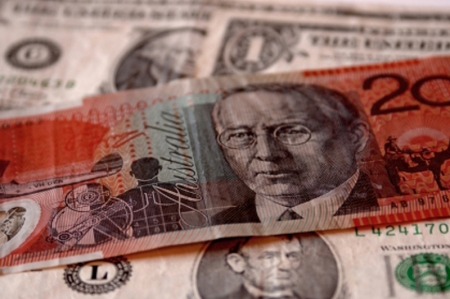
Investing.com– Most Asian currencies kept to a tight range on Tuesday, while the dollar steadied from recent losses as focus remained squarely on a tight U.S. presidential race and an upcoming Federal Reserve meeting.
The Australian dollar firmed slightly after the Reserve Bank of Australia kept interest rates unchanged and warned that rates will remain high in the near-term due to concerns over sticky inflation.
Among regional markets, focus also remained on an ongoing meeting of China’s National People’s Congress, where policymakers are widely expected to outline plans for more fiscal spending.
Most Asian currencies were nursing steep losses through October amid growing speculation that Donald Trump will win a second term. But this trade came undone in recent sessions, offering regional markets some relief.
AUDUSD ticks higher after RBA
The Australian dollar’s AUDUSD pair rose 0.1% after the RBA kept interest rates steady and said monetary policy will remain restrictive due to concerns over sticky inflation.
The move was widely expected by markets, given that the RBA has provided few cues that it plans to begin cutting interest rates.
While high for longer interest rates bode well for the Australian dollar, gains in the currency were stymied by the RBA flagging increased uncertainty over the Australian economy, with growth expected to slow further in the coming quarters.
Still, the RBA is now expected to keep rates steady until at least early-2025 to combat sticky inflation, putting it in contrast to other major global central banks.
Dollar steady with elections, Fed in focus
The dollar index and dollar index futures both rose 0.1% each in Asian trade, steadying from losses over the past two sessions.
The greenback was in part hit by an unwinding “Trump trade,” as recent polls showed Trump and Kamala Harris set for a tight presidential race. Voting is set to begin later on Tuesday.
Focus later this week is also on a Fed meeting, where the central bank is widely expected to cut interest rates by 25 basis points, a smaller cut than the 50 bps seen in September.
Traders will be watching for any more cues from Fed Chair Jerome Powell on the bank’s plans to cut rates further, especially as recent data showed stickiness in U.S. inflation and resilience in the economy.
But the labor market was also seen deteriorating, which could keep the Fed biased towards more easing.
Broader Asian currencies were flat as anticipation of the U.S. elections and the Fed meeting kept traders on the sidelines.
The Chinese yuan’s USDCNY pair rose 0.1%, with focus remaining on an NPC meeting that is expected to yield more cues on China’s plans for fiscal stimulus.
The Japanese yen weakened and remained close to its weakest level in three months, with the USDJPY pair rising 0.2%.
The South Korean won’s USDKRW pair rose 0.5% after data showed consumer inflation missed expectations in October, likely drawing more interest rate cuts from the Bank of Korea.
The Indian rupee’s USDINR pair steadied well above the 84 rupee level after hitting a record high earlier in the session.
This post is originally published on INVESTING.






